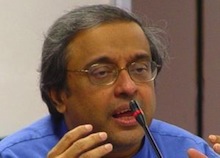2016: The Twin Challenge

Elite corruption not only undermines the faith of domestic and foreign investors in the economy but it also subverts the people’s trust in their leaders — the single most important factor that ensures a government’s credibility and protects its moral legitimacy.
Dr. Chandra Muzaffar, Chairman of the Board of Trustees of Yayasan 1Malaysia.
As we enter 2016, it is apparent that the two major challenges that will face the nation are related to the economy, on the one hand, and integrity, on the other. Both have serious implications for national unity and social cohesion.
For most Malaysians — and not just the poor — the increasing cost of living is their greatest worry. In a situation in which the nation’s revenue has shrunk mainly because of the global fall in oil prices, it goes without saying that both the public and private sectors will not be able to sustain their current level of employment. Growing unemployment will further erode the economy.
While the increasing cost of living and growing unemployment have little to do with ethnicity, prevailing economic patterns lend themselves to perceptions which could impact negatively upon ethnic relations. The majority of the urban poor hurt badly by the increasing cost of living are Malays. The urban retail and wholesale trade is still in Chinese hands. Any allegation of cheating by a minority in this trade can so easily be twisted into a communal issue by unscrupulous individuals with their own nefarious agendas. Even the wide chasm between the ‘have-a-lot’ and the ‘have-a-little’ which is a socio-economic challenge can be distorted to suit the communal objectives of certain unethical political actors.
In a situation like this, the media — including the new media — have a huge responsibility to convey honest and accurate information to the people. They have no reason to play up to the communal gallery. Educating the public with facts and figures accompanied by knowledgeable analysis should be their mission.
In fact, the media should do more. They should name and shame those activists and politicians who are deliberately fueling communal anger. At the same time, the media should insist that politicians, opinion makers and civic leaders within a particular community openly condemn unscrupulous trade practices and dishonest traders. They should urge the dishonest to change their ways. The authorities should be asked to take swift, punitive action against them.
Effective enforcement which remains a major shortcoming in our system of governance should become the hallmark of departments and agencies entrusted with the responsibility of ensuring that traders adhere to the highest ethical standards.
The media and other role players can only do so much. Both the public and private sectors should adopt more proactive measures to check the rising cost of living and create more jobs.
Stimulating domestic production, especially food, supporting and strengthening the role of small and medium-sized enterprises through assistance for research and development (R&D) and enabling cooperatives to participate more meaningfully in various sectors of the economy would help to ameliorate the situation. Monopolistic strangleholds exercised by certain companies over certain economic activities should be broken.
But sustained economy recovery will not be possible unless there is a sincere endeavor to eradicate corruption and to strengthen integrity. Elite corruption not only undermines the faith of domestic and foreign investors in the economy but it also subverts the people’s trust in their leaders — the single most important factor that ensures a government’s credibility and protects its moral legitimacy.
Unfortunately, in a society in which the crux and core of political leadership and public administration comes from a particular community, the apparent lack of integrity is erroneously given an ethnic slant. This then becomes fodder for communal minded politicians and activists, thus exacerbating ethnic relations. Efforts by the Malaysian Anti-Corruption Commission (MACC) in recent years to act against the givers, and not just the takers, in corruption cases and to investigate instances of graft in the private sector with greater vigor have altered a little public perceptions of ethnicity and integrity.
Nonetheless, because of this and other ramifications, elites should demonstrate that they are really sincere in wanting to eradicate corruption. Transparency and accountability in political financing which I had first proposed in 1978 should not be confined to the larger electoral process and should include the way in which money is used within a party to win support for various office-holders. Laws on the public declaration of the assets and liabilities of legislators and their immediate families; prohibitions on close relatives of Federal Cabinet Ministers and Deputy Ministers, apart from State Executive Councilors, bidding for government projects and contracts; and restrictions on agents and ‘runners’ getting involved in procurement exercises, should be put in place immediately.
Most of all, the 1MDB saga should be brought to a close within the first quarter of 2016 in an honest and ethical manner. What this means is that the truth about the state investment company its past and present subsidiaries and their operations should be revealed to the public, without any cover-up. Perhaps the MACC’s submission to the Attorney-General this week on 1MDB’s former subsidiary, SRC International, and the 2.6 billion ringgit in the Prime Minister’s personal bank account will contain some important information.
The public is also expecting some action from Bank Negara based upon its earlier investigations. The Auditor-
General will be sharing his findings with the Public Accounts Committee whose report to Parliament early next year may tell us the whole story. The Malaysian people hope that once everything is known, and if there are wrongdoers, they would be punished according to the law.
The resolution of the 1MDB saga with full accountability will not only be a tremendous boost for integrity but will also be a shot in the arm for the Malaysian economy.

